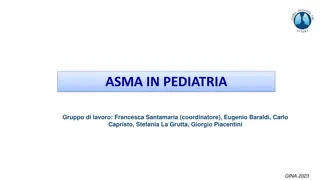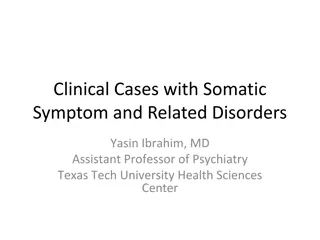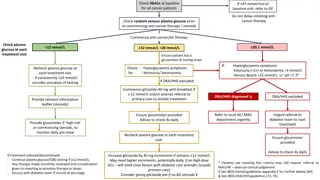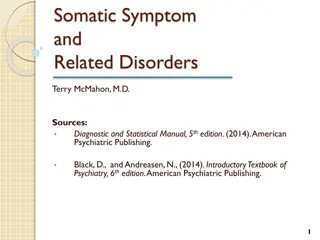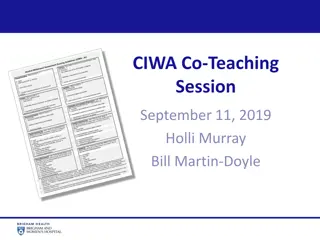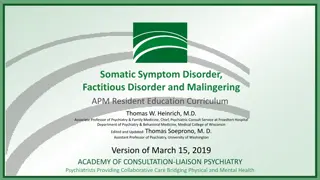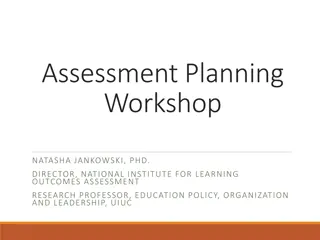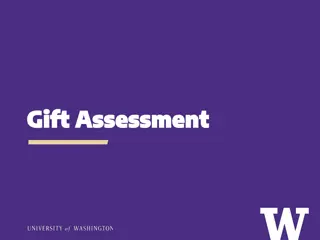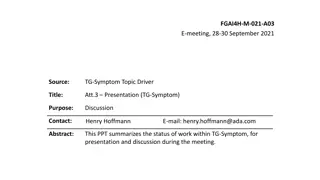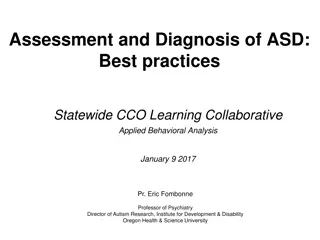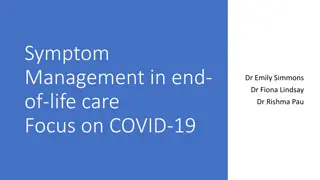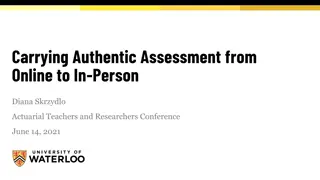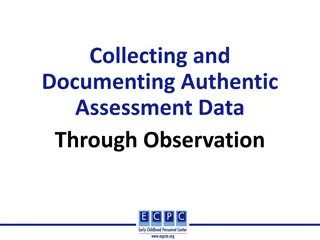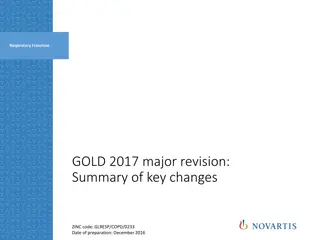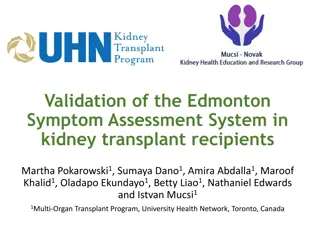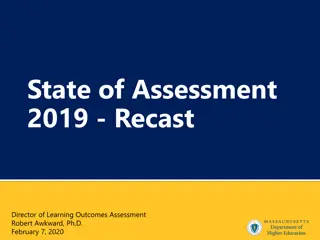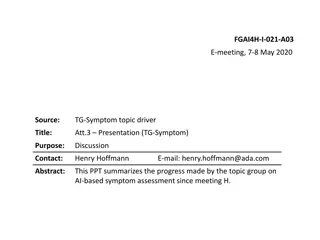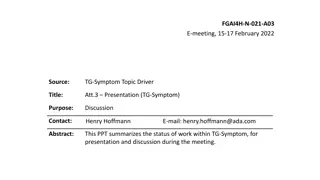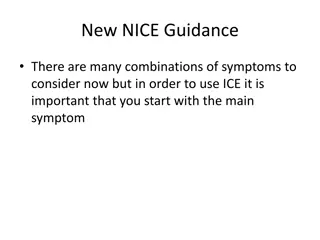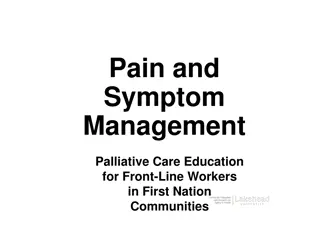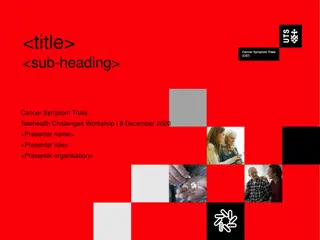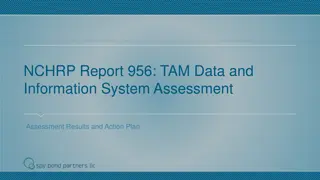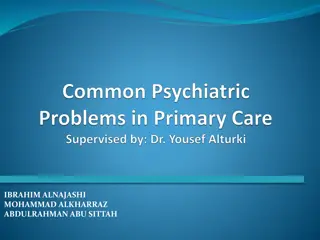ASMA IN PEDIATRIA
Pediatric asthma guidelines for children aged 5 years and above, outlining diagnosis criteria, symptom patterns, and treatment recommendations based on GINA 2023. The content covers characteristics suggestive of asthma, including recurrent non-productive cough, wheezing, and shortness of breath, and
3 views • 30 slides
Sheffield Early Help Assessment Form Update and Integration with Extended Support Plan
Sheffield has introduced an updated Early Help Assessment form to streamline the assessment process within the Early Help System. This new form combines the Early Help Assessment with the Extended Support Plan, aligning various assessment tools and referral forms into one comprehensive document. The
5 views • 22 slides
Enhancing Language Learning Through Peer Assessment
Explore the benefits of peer assessment as a valuable tool for language learning, comparing it with self-assessment. Discover the components and challenges of self-assessment, along with the potential of peer assessment to improve accuracy and promote self-regulation. Gain insights into what peer as
3 views • 29 slides
Overview of DSW End Point Assessment Team Leader Level 3
DSW End Point Assessment Team Leader Level 3 provides a clear understanding of the assessment process, ensuring individuals comprehend why and when it occurs, responsibilities involved, and how DSW supports them. It covers topics such as what End Point Assessment entails, assessment design and deliv
1 views • 18 slides
Complex Case Study: Chronic Pain and Somatic Symptom Disorder
Michelle Adams, a 51-year-old hairdresser, presents with severe chronic back pain following a traumatic incident. Despite various treatments and medications, her pain persists, leading to distress and functional impairment. Her symptoms align with Somatic Symptom Disorder (SSD) with predominant pain
0 views • 50 slides
Understanding Somatic Symptom Disorders, Conversion Disorders, and Dissociative Disorders
Somatic symptom disorders manifest as physical symptoms without apparent cause, while conversion disorders involve specific physical symptoms incompatible with medical conditions. Illness anxiety disorder involves interpreting normal sensations as disease symptoms. Dissociative disorders lead to a s
1 views • 41 slides
Guidelines for Managing Hyperglycemia in Cancer Patients Receiving Anti-Cancer Therapy
Cancer patients undergoing anti-cancer therapy need vigilant monitoring for hyperglycemia. Baseline HbA1c and random plasma glucose levels must be checked before initiating therapy. Regular glucose monitoring, symptom assessment, and ketone testing are crucial throughout treatment. Prompt referrals,
0 views • 4 slides
Understanding Somatic Symptom and Related Disorders
Exploring the key features, diagnostic criteria, contributing factors, and management principles of Somatic Symptom and Related Disorders. This comprehensive guide covers the clinical manifestations, co-morbidities, and treatment approaches associated with these disorders, shedding light on somatic
2 views • 38 slides
Comprehensive Overview of CIWA-Ar Scale for Alcohol Withdrawal Management
This article provides detailed information on the Clinical Institutes Withdrawal Assessment Scale for Alcohol (CIWA-Ar), focusing on its utilization in managing alcohol withdrawal symptoms. It covers learning objectives, signs and symptoms of alcohol withdrawal, complications, timelines, and the ben
0 views • 18 slides
Understanding Somatic Symptom Disorder and Related Disorders
This educational material delves into Somatic Symptom Disorder, Factitious Disorder, and Malingering, emphasizing the importance of accurate diagnosis and management. It explores various aspects, including symptoms, classifications, and implications in bridging physical and mental health. The conten
0 views • 91 slides
Understanding Assessment in Medical Education
Exploring the concepts of assessment in medical education, including defining assessment, types of assessment, reliability, validity, and aligning assessment methods with intended learning outcomes. The importance of constructive alignment and the impact of assessment on learning outcomes are also d
1 views • 12 slides
Assessment Matters in Sociology: Enhancing Learning Through Evaluation
Explore the significance of assessment in sociology education, focusing on key questions to evaluate current assessment procedures, review individual course assessments, and develop strategies to enhance student learning outcomes. Delve into the centrality of assessment in the learning process, with
1 views • 15 slides
Insights into Managing Assessment in the Classroom by Assessment Research Group
Explore the importance of standards and assessment in education through the lens of the Assessment Research Group. Gain valuable perspectives on curriculum delivery, understanding the assessment system, learner assumptions, task parameters, and more. Discover how language, structure, and agency play
2 views • 25 slides
Workshop on Assessment Planning by Dr. Natasha Jankowski
Dr. Natasha Jankowski, Director of the National Institute for Learning Outcomes Assessment, conducts a workshop focusing on effective use of assessment data to enhance undergraduate education. The workshop covers areas like evaluating assessment plans, program learning outcomes, and assessment rubri
0 views • 30 slides
Enhancing Understanding through Assessment in Educational Design Workshop
Learn and collaborate on assessment practices in education design at the "Understanding by Design Assessment Focus" workshop. The agenda includes sessions on summative and formative assessment, feedback, reporting, and more. Engage in activities like generating questions, finding destination partner
1 views • 76 slides
End-of-Life Symptom Management for COVID-19 Patients: A Comprehensive Guide
This comprehensive guide focuses on symptom management in end-of-life care for COVID-19 patients, covering identification of signs of dying, communication with residents and families, recognition of end-of-life symptoms, and pharmacological/non-pharmacological approaches. It also provides valuable r
0 views • 19 slides
Institutional Assessment Planning Workshop Feedback and Insights
Feedback and insights from a recent institutional assessment planning workshop led by Dr. Mark Nicholas at FSU S. Warren Conference Center & Inn. Participants provided feedback on the usefulness of the content, presenter knowledge, ability to develop assessment plans, post-training assessment knowle
1 views • 9 slides
Understanding Higher Education Assessment: The Complete Guide
Higher education assessment involves a systematic process of collecting, reviewing, and utilizing information to improve student learning and development. This guide covers the assessment cycle, learning outcomes, the mission behind assessment in higher education, what assessment is and is not, reas
1 views • 36 slides
Human Disease Symptom Network: Understanding Disease Relationships Through Symptoms and Genes
The Human Disease Symptom Network (HSDN) is constructed using a large-scale medical bibliographic records database to form a network of human diseases based on symptom similarities. By integrating disease-gene associations and protein-protein interaction data, correlations between symptom similarity
0 views • 37 slides
Understanding Gift Assessment Process at University of Washington
The Gift Assessment Process at University of Washington involves applying a 5% assessment to select current-use gifts over $1,000 and under $5 million. This assessment supports the university's advancement efforts and institutional priorities by transferring 5% of eligible contributions to the Provo
1 views • 5 slides
Overview of Environmental Impact Assessment and Strategic Environmental Assessment Directives
Environmental Impact Assessment (EIA) and Strategic Environmental Assessment (SEA) play crucial roles in evaluating the impact of planned activities on the environment. This content delves into the concept, origins, development, and key elements of environmental assessment, discussing the legal fram
2 views • 35 slides
Progress Report on AI-Based Symptom Assessment in Healthcare
This report provides an overview of the advancements in AI-based symptom assessment for healthcare applications. It covers the discussion points from the recent e-meeting, presentation updates, and the current status of benchmarking systems and ontology work within the Topic Group Symptom. The focus
1 views • 11 slides
Understanding Autism Spectrum Disorder: Assessment, Diagnosis, and Characteristics
This content delves into the assessment and diagnosis of Autism Spectrum Disorder (ASD) with a focus on early markers, DSM-5 criteria, language/communication abnormalities, social interaction abnormalities, and repetitive behaviors/unusual interests. It provides a comprehensive overview of the key a
0 views • 20 slides
Institutional Assessment and Effectiveness Workshop Achievements at SUNY Oneonta
The Office of Institutional Assessment and Effectiveness at SUNY Oneonta has made significant progress in developing assessment protocols and processes, leading to a culture of assessment. This includes completing planning and assessment cycles, establishing objectives and procedures, and aligning u
1 views • 16 slides
Oregon Department of Education Assessment and Accountability Resources
Access important information on assessments, accountability, and reporting from the Oregon Department of Education. Find resources on updating assessment records, accessing student scores, and staying informed about assessment requirements for the 2023-24 academic year. Explore links for assessment
0 views • 55 slides
Oregon Department of Education - Assessment Resources and Updates
Explore the Assessment Record Updating Application (ARUA), Accountability Warehouse Extract (AWE), Secure Assessment Reports, and other important tools and information provided by the Oregon Department of Education for assessment data owners, analysts, and partners. Access links for assessment admin
0 views • 54 slides
Boise Bible College Fall 2020 Covid-19 Guidelines
Boise Bible College's Fall 2020 Covid-19 guidelines prioritize face coverings, physical distancing, hand hygiene, and symptom monitoring. These guidelines emphasize flexibility and grace while aiming for the safety and well-being of the college community. Measures such as mandatory face coverings, s
0 views • 9 slides
Symptom Management in End-of-Life Care: Focus on COVID-19
Review signs of dying, communicate effectively with residents and families, identify end-of-life symptoms (especially related to COVID-19), and explore non-pharmacological and pharmacological approaches for symptom management. Resources and guidance are provided for caring for individuals in the com
0 views • 19 slides
Enhancing Teaching Assessment for Actuarial Education
Exploring the transition of assessment practices from online to in-person settings, this presentation by Diana Skrzydlo at the Actuarial Teachers and Researchers Conference delves into the purpose of assessment, key principles, and activities for effective evaluation. Discover insights on diagnostic
0 views • 10 slides
Authentic Assessment through Systematic Observation: Best Practices
Explore the process of authentic assessment through systematic observation in early childhood education. Learn about collecting, documenting, and interpreting assessment data using evidence-based practices and technology. Discover the importance of working collaboratively with families and professio
0 views • 53 slides
GOLD 2017 Major Revisions in COPD Management
GOLD 2017 introduces significant changes in Chronic Obstructive Pulmonary Disease (COPD) management, focusing on areas like defining COPD, assessment tools, pharmacological management, inhaler techniques, and comorbidity management. The updated definition emphasizes persistent respiratory symptoms.
0 views • 17 slides
Validation of the Edmonton Symptom Assessment System in Kidney Transplant Recipients
Patient-reported outcomes play a crucial role in understanding the symptom burden and quality of life in chronic kidney disease patients, including kidney transplant recipients (KTRs). This study assesses the validity and reliability of the Edmonton Symptom Assessment System in KTRs, focusing on phy
0 views • 21 slides
Assessment Practices in Higher Education Institutions
Dive into the state of assessment for the year 2019, featuring insights on hosting assessment days, establishment of assessment committees, implementation of institutional and program learning outcomes, appointment of a Director of Assessment, compensation for faculty members focusing on assessment,
0 views • 8 slides
Update on AI-Based Symptom Assessment Progress
This presentation summarizes the progress made by the topic group on AI-based symptom assessment since the E-meeting held on 7-8 May 2020. It covers the AI task related to symptom assessment, the journey and approach of the group so far, and the current status of the topic group members and contribu
0 views • 9 slides
AI-Based Symptom Assessment Applications in Healthcare
The presentation highlights the status of work within TG-Symptom for discussion during the e-meeting. It covers AI-based symptom assessment mobile/web applications, pre-clinical triage, and differential diagnosis. The meeting provides updates on symptom assessment and benchmarking approaches within
0 views • 13 slides
Updated Guidance on Colonic Imaging Tests for Various Symptoms
The new NICE guidance outlines recommended tests based on different symptom complexes, emphasizing the importance of starting with the main symptom, such as rectal bleeding or abdominal mass. Specific tests like flexible sigmoidoscopy, colonoscopy, or CT scans are suggested depending on age and fitn
0 views • 5 slides
Comprehensive Guide to Pain and Symptom Management in Palliative Care Education
Explore a comprehensive guide on pain and symptom management in palliative care education, emphasizing the importance of effective care plans and team participation. Learn about different types of pain, perception variations, and total pain factors affecting end-of-life care in First Nation communit
0 views • 28 slides
Cancer Symptom Trials Telehealth Challenges Workshop
Cancer Symptom Trials Telehealth Challenges Workshop held on 8th December 2020 addressed various clinical challenges in telehealth, including how they impact clinicians and patients. The workshop focused on cancer symptoms, evidence, gaps in research, and a proposal for future studies.
0 views • 5 slides
NCHRP Report 956 TAM Data and Information System Assessment
This content provides an overview of NCHRP Report 956 focusing on the TAM data and information system assessment results and action plan. It includes details on assessment outcomes, recommendations, implementation action plans, and tools for self-assessment and improvement methodology. The content a
0 views • 21 slides
Understanding Anxiety, Depression, and Somatic Symptom Disorder in Saudi Arabia
This content discusses the prevalence, etiology, clinical features, and management of anxiety, depression, and somatic symptom disorder in Saudi Arabia. It also covers the importance of counseling and psychotherapy in family medicine settings and knowing when to consult a psychiatrist. The content i
0 views • 50 slides
